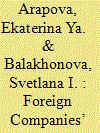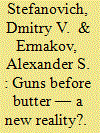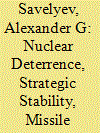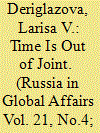|
|
|
Sort Order |
|
|
|
Items / Page
|
|
|
|
|
|
|
| Srl | Item |
| 1 |
ID:
192498


|
|
|
|
|
| Summary/Abstract |
D
ue to its unique geographical and geopolitical location,
Central Asia has always been a crossroads for great powers.
Because of the special nature of relations between Central
Asia and Russia, great power relations for the Central Asian countries
are of particular importance, including with regard to their political
security. Therefore, proper management of great power relations is not
only a diplomatic skill for Central Asian countries, but also a way to
ensure their security and stability.
|
|
|
|
|
|
|
|
|
|
|
|
|
|
|
|
| 2 |
ID:
192495


|
|
|
|
|
| Summary/Abstract |
The authors examine a close connection between the European Union’s
resilience and identity in academic and contemporary political discourse.
In the latter case, the sources of the EU’s resilience have not yet been
identified, but the Russian factor has come as a variable that determines
the connection between resilience and identity in the context of the Russia-
Ukraine clash as a conflict of values. As a non-systemic challenge, Russia’s
special military operation (SMO) in Ukraine has shifted the focus in the
EU’s search for the sources of resilience and made it face the problems of
self-identity in a changed environment. The article argues that the EU’s
collective identity may be a factor of its resilience. It concludes that, given
the European Union’s previous unsuccessful experience of appealing to
collective identity in crisis situations, its use in the face of Russia’s special
military operation will be limited, although it has highlighted the need for
strengthening the EU’s identity.
|
|
|
|
|
|
|
|
|
|
|
|
|
|
|
|
| 3 |
ID:
192493


|
|
|
|
|
| Summary/Abstract |
This study aims to assess the scale of foreign companies’ withdrawal from
the Russian market after the start of the Special Military Operation in
Ukraine as well as the possibility of replacing them with counterparties
from jurisdictions that have not joined anti-Russian sanctions. Expert
assessments are based on the original database on foreign business
behavior compiled by the Institute for International Studies at the
Russian Foreign Ministry’s MGIMO University. The analysis shows that
relatively small foreign companies are leaving the Russian market, while
large international corporations are scaling back their operations in
Russia and are more inclined to adapt to the new conditions. The negative
impact on the Russian economy as a whole appears to be not as big
as the assessment based on the Yale Database of foreign companies
would suggest. The Russian IT sector, the business services sector,
and the financial sector have expectedly proved to be relatively more
vulnerable. At the same time, the natural resources sector (power and
mining industries) is relatively more stable, and cooperation with state-
owned (or state-affiliated) companies in jurisdictions that do not support
sanctions against Russia has the best prospects.
|
|
|
|
|
|
|
|
|
|
|
|
|
|
|
|
| 4 |
ID:
192496


|
|
|
|
|
| Summary/Abstract |
This article aims to contribute to the discussion about the ongoing
transformation of the present unipolar, hegemonistic capitalist world
order to a multipolar and fairer global system. The author claims that this
transformation is taking place through the encirclement of the imperialist
center by the developing and emerging countries of the global periphery.
Previous waves of global encirclement are described and the reasons for
its decline in the 20th century are analyzed. The paper also discusses the
role played by China and Russia in the struggle for a multipolar world in
the 21st century. The author argues that only a non-hegemonic multipolar
world order can guarantee nations an independent choice of their path of
socio-economic development and open the way for a socialism-oriented
transformation in all countries.
|
|
|
|
|
|
|
|
|
|
|
|
|
|
|
|
| 5 |
ID:
192492


|
|
|
|
|
| Summary/Abstract |
Warfighting in Ukraine in 2022-2023 has become the first large-scale armed
conflict in Europe in the 21st century that directly involves Russia and
NATO. The scale of events, the geography of operations, the number of
weapons used and the personnel engaged require a reassessment of military
development and defense spending priorities in many countries around the
world. This article analyzes certain features of the current armed conflict
and the decisions already made by individual countries. The authors come
to the conclusion that given the scale of military buildup in Europe and
elsewhere it is advisable to think about new measures to reduce risks now
and establish effective arms control in the future.
|
|
|
|
|
|
|
|
|
|
|
|
|
|
|
|
| 6 |
ID:
192497


|
|
|
|
|
| Summary/Abstract |
The article explores ways to ensure the internal consolidation of the BRICS
group, which is at a crucial stage of its development due to the sharply
changed geopolitical situation. It emphasizes that the issue of BRICS’
enlargement, which has taken central stage lately due to the desire of more
than two dozen states to join it, should not sideline the task of deepening
economic interaction within the group, structuring it further, and turning
it into a full-fledged economic cooperation organization.
|
|
|
|
|
|
|
|
|
|
|
|
|
|
|
|
| 7 |
ID:
192494


|
|
|
|
|
| Summary/Abstract |
The essay discusses Russia’s mission in the contemporary world, as expressed
in the concept of the “Russian Idea.” Some Russian thinkers view the
country as a fortress defending itself (and the world) from alien—primarily
Western—civilizations. Others associate the “Russian Idea” with a bridge
connecting different nations and civilizations. The question of whether
Russia should be focused primarily on protecting national foundations and
geopolitical boundaries or propose an ambitious, transformative agenda has
important practical implications. The essay aims to draw attention to two
sides of the concept—the nationally defensive and the one related to the
dialogue of civilizations, possibly connecting them with each other.
|
|
|
|
|
|
|
|
|
|
|
|
|
|
|
|
| 8 |
ID:
192490


|
|
|
|
|
| Summary/Abstract |
By the fall of 2023, the military
campaign in Ukraine had become
an integral part of the international
political and economic landscape.
Currently, no end of hostilities is
expected: neither a decisive victory
of either side, nor a peace agreement
based on a compromise seems likely
in the foreseeable future. The conflict
remains the main factor affecting the
global balance of power.
|
|
|
|
|
|
|
|
|
|
|
|
|
|
|
|
| 9 |
ID:
192491


|
|
|
|
|
| Summary/Abstract |
The article addresses a set of problems pertaining to nuclear deterrence,
strategic stability, and missile defense. The author states that as a derivative
of nuclear deterrence strategic stability can only be applied to military-
strategic relations between Russia and the United States. This concept
“does not work” in all other cases, including the multilateral format of
relations. Nuclear deterrence is more universal and impacts, among other
things, the decision-making process in relatively strong and weak nuclear
states that oppose each other. The effectiveness of nuclear deterrence is
not determined solely by the balance of opposing forces. No less important
is the assessment by a potential aggressor of all the negative consequences
of its decision to strike first, which creates the “self-deterrence” effect that
outweighs even the aggressor’s absolute confidence in the complete military
success of its nuclear attack.
|
|
|
|
|
|
|
|
|
|
|
|
|
|
|
|
| 10 |
ID:
192501


|
|
|
|
|
| Summary/Abstract |
T
his essay is a comment on Larisa Deriglazova’s article “Time
Is Out of Joint”: EU and Russia in Quest of Themselves in
Time published above. This chiefly explains the way this text
is structured, which might otherwise look somewhat odd. Larisa
Deriglazova’s article, which served both as the reason and occasion
for writing this essay, deals with two different topics: firstly, memory
politics discourse in Russia and in the European Union over the
last decades, and, secondly, problems of modernization—from the
state of affairs proper to differences in understanding the essence
of modernization. The latter, in fact, allowed the author to merge
the two topics.
|
|
|
|
|
|
|
|
|
|
|
|
|
|
|
|
| 11 |
ID:
192499


|
|
|
|
|
| Summary/Abstract |
The article assesses prospects for the development of relations between the
Russian Federation and the Korean Peninsula states in the short and medium
terms. By assessing their current state in the context of global changes
in the world, the authors determine areas where the national interests
of Russia, North Korea and South Korea overlap, identify factors that can
influence the development of relations between Russia and these states
(primarily bilateral, but also taking into account the third party’s influence
on them), and consider possible trajectories for their further evolution. The
article concludes that in the short term, relations between Russia and South
Korea will tend to deteriorate, although the speed of this deterioration will
depend on the steps to be taken by Seoul. Relations between Moscow and
Pyongyang, on the contrary, will formally improve, although the speed of
this improvement will be determined, among other things, by the situation
around the Korean Peninsula nuclear issue.
|
|
|
|
|
|
|
|
|
|
|
|
|
|
|
|
| 12 |
ID:
192500


|
|
|
|
|
| Summary/Abstract |
The current direct confrontation between Russia and the Western
countries in Europe was not unexpected, but its possible consequences
are frightening. In this article the author suggests looking at the conflict
between Russia and the EU through the lens of Aleida Assmann’s concept
of “temporal breach” in the “modern time regime” (modernity). One of
the reasons for the escalation is that the conflicting sides have different
visions of the past, present and future, as well as of their place in the new world. The author also traces the development of modernization theory and
analyzes the modernization practices Russia and EU countries chose to use
after 1991. Russia has largely been practicing conservative modernization,
where the state is the main actor relying on certain public demand. The EU
countries have been implementing a multi-vector liberal modernization
model in line with the goals of post-industrial society, with a variety of state
and non-state actors involved and the focus put on the human rights value.
|
|
|
|
|
|
|
|
|
|
|
|
|
|
|
|
|
|
|
|
|